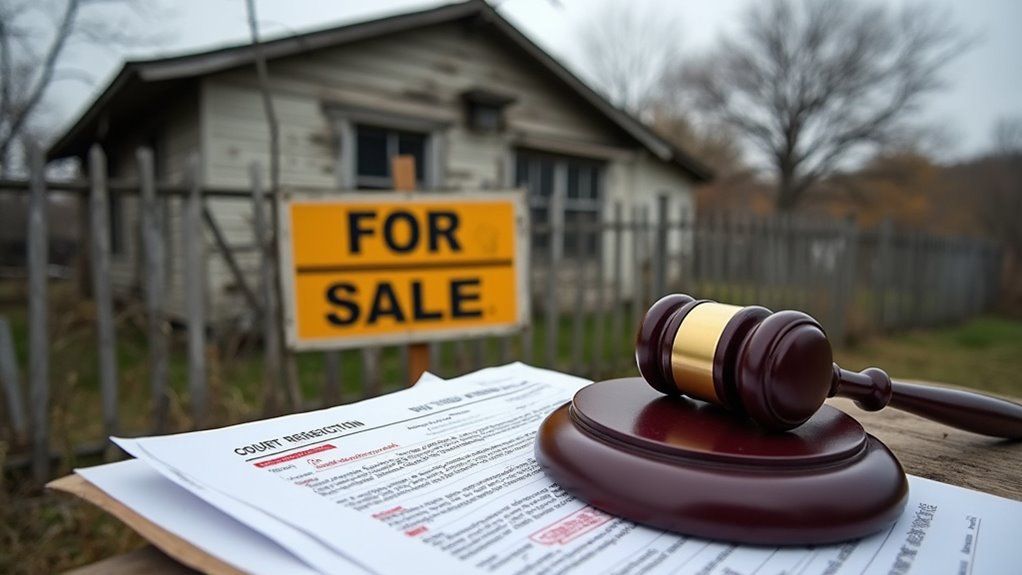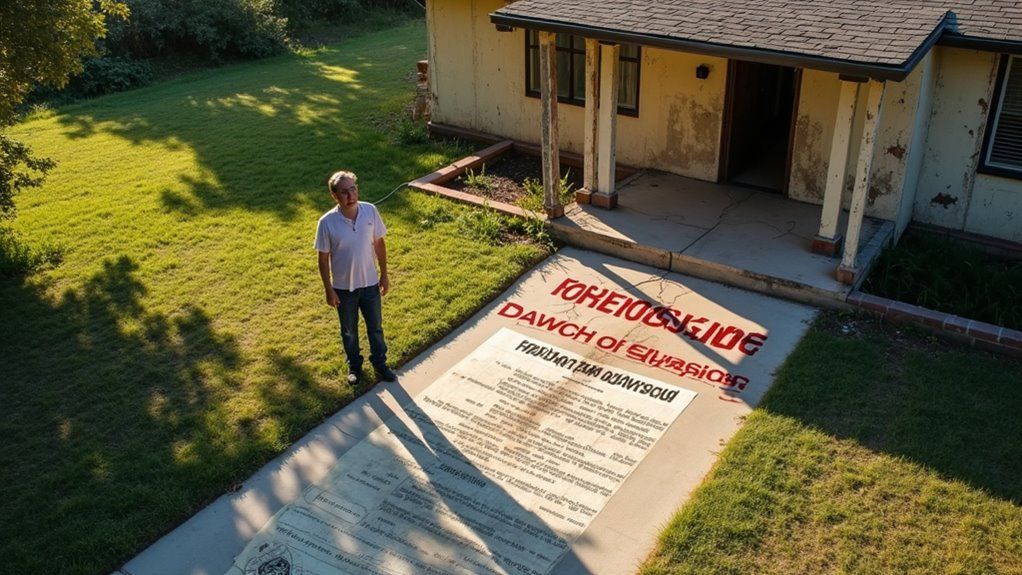
Trapped between four walls that once felt like home, you now face a legal bulldozer in the form of a court-ordered sale. Defying this order places you in dangerous legal territory with potentially devastating financial consequences. The judicial system holds all the cards when property owners resist, while proper response strategies can still protect some of your interests.
Ignoring a court order to sell your house triggers severe penalties including contempt charges, fines and possible incarceration. Courts can proceed with forced sales at below-market prices, deducting accumulated legal expenses from your proceeds while damaging your credit for years.
In this blog I will explore everything related to court-ordered home sales and their serious consequences.
Key Takeaways
- Ignoring a court order can lead to contempt charges, fines, or jail time, and increases legal and enforcement costs.
- Courts may appoint officials to sell your property without your cooperation, often below market value.
- Non-compliance damages your credit score for up to seven years, affecting future property transactions.
- Property owners risk daily fines, sanctions, and complicated legal procedures if they delay or refuse to comply.
- Valid defenses include procedural errors, financial hardship, ownership disputes, or changed circumstances, which can halt or modify the sale.
What Happens if You Ignore a Court Order to Sell Your House?

Ignoring a court order to sell your house results in severe legal consequences. You may face contempt of court charges, leading to fines or jail time.
Courts can impose judicial enforcement allowing them to sign documents on your behalf. This enables the sale to proceed without your permission or involvement.
Your credit score will suffer significant damage when you disobey court orders. The court will likely restrict your rights to contest the proceedings further.
Additionally, you may be held responsible for legal fees and costs incurred during the enforcement process. Most importantly, resolution becomes more difficult the longer you delay compliance.
How to Respond to a Court-Ordered House Sale?

To respond effectively to a court-ordered house sale, start by carefully reviewing all legal documents to understand your obligations.
Then, consider seeking legal representation to investigate options like filing an appeal, requesting a stay, or negotiating alternative solutions.
Acting promptly and confidently can help you protect your rights and possibly avoid or modify the sale process.
Understanding the Legal Documents
You must read all court documents about house sales carefully. Check deadlines, required actions, and potential penalties listed in the court order.
Violating judicial orders may result in fines, contempt charges, or forced property sales.
These documents contain legally binding instructions you can’t ignore. The court expects full compliance within specific timeframes. Additionally, understanding legal terminology helps you respond appropriately.
Court orders typically specify who must vacate the property, payment distribution methods, and completion deadlines. As a result, having a legal professional review these documents can prevent mistakes.
Seeking Legal Representation
You need a lawyer when facing a court-ordered house sale. An attorney protects your rights and builds defenses against forced sales.
Lawyers provide essential advice about your legal options and potential outcomes. A good attorney negotiates alternatives to selling your property.
They guide you through complex court procedures to prevent penalties. Your lawyer communicates with the court on your behalf, ensuring proper legal interactions. Legal representation helps shield your ownership interests under applicable laws.
The right attorney can identify defenses you mightn’t know exist. Through professional guidance, you’ll understand your position and make informed decisions about your property.
Filing an Appeal or Motion to Stay
To file an appeal or motion to stay, act quickly within the specified timeframe. Appeals must typically be submitted within 30 days after the court’s decision.
Your filing should include strong evidence such as financial hardship or procedural errors in the original ruling. Legal documents require precise formatting and adherence to court rules.
A successful motion demonstrates clear reasons why the sale should be delayed. Courts examine whether immediate enforcement would cause irreparable harm to your situation.
For best results, consult with an attorney who specializes in appeals. They can help prepare proper documentation and develop compelling arguments. Legal representation significantly increases your chances of having the motion granted.
Negotiating Alternative Solutions
You can challenge a court-ordered house sale through several negotiation strategies. Legal options exist to help you maintain ownership.
Request more time to arrange your affairs before the property sale occurs. The court may grant extensions in certain hardship situations. Courts typically allow 30-90 days depending on local regulations.
Alternative payment plans might satisfy the judgment without selling your home. These arrangements often involve monthly installments with fixed interest rates.
Furthermore, buying out the other party’s share can eliminate the need for a complete sale.
Professional legal representation increases your chances of successful negotiation. A lawyer can identify loopholes and present your case effectively.
What Are the Legal Consequences of Non-Compliance?

Ignoring a court order to sell your house can lead to serious legal consequences, including contempt charges that may result in fines or jail time. You could also face financial penalties and sanctions, increasing your overall costs.
Ultimately, the court may order a sheriff or commissioner to force the sale, and your credit score could suffer, making future property purchases difficult.
Contempt of Court Charges
Non-compliance with a court order to sell your house can result in contempt charges. A judge will evaluate your actions during a formal contempt hearing.
Penalties may include fines up to several thousand dollars or jail time ranging from days to months. The court might also appoint someone to sign documents on your behalf.
These consequences extend beyond immediate penalties. Your legal credibility suffers damage that affects future court proceedings.
Additionally, the court may order you to pay the opposing party’s legal fees. The impact on your financial situation and reputation can be long-lasting.
Financial Penalties and Sanctions
Courts use financial penalties to enforce property sale orders. You may face fines that grow daily until you comply with the court’s decision. These can include court costs and attorney fees charged directly to you.
Daily fines accumulate continuously while you remain non-compliant with the sale order.
The court may also appoint officials to complete the sale without your cooperation. Your credit score can suffer long-term damage from these enforcement actions.
Beyond immediate costs, extended non-compliance typically leads to harsher consequences. Furthermore, the court may order you to pay all legal expenses for both parties.
Forced Sale Through Sheriff or Commissioner
A sheriff or commissioner handles forced home sales when you don’t follow court orders. The court appoints them to sell your property without your consent.
This process removes your control over the sale. Your home typically sells below market value at auction. Legal fees and enforcement costs will be deducted from your proceeds.
Furthermore, the timeline accelerates dramatically. The court prioritizes resolution over maximum profit. As a result, you receive less money than in a standard sale.
To avoid these consequences, comply with the original court order promptly. This approach preserves more of your equity and reduces stress.
Impact on Credit Score and Future Property Purchases
Defying a court order to sell your house will severely damage your credit score. Non-compliance leads to legal penalties such as liens and possible foreclosure actions against your property.
These negative marks remain on your credit report for up to seven years. Your ability to qualify for mortgages or other loans will significantly decrease.
Financial institutions view court judgments as serious red flags when reviewing loan applications. The consequences extend beyond immediate financial penalties.
Your borrowing capacity may be restricted for years to come. Additionally, future property purchases become more difficult as lenders hesitate to work with individuals who’ve demonstrated legal non-compliance.
Why Would a Court Order the Sale of a House?
Courts order house sales to resolve disputes or settle debts when necessary. Whether in divorce, bankruptcy, co-owner disagreements, foreclosure, or tax liens, a sale ensures that legal obligations are met. Ignoring these orders can lead to serious legal and financial consequences.
Divorce Proceedings and Property Division
Courts may order house sales during divorce to divide assets fairly. The judge weighs several factors before making this decision.
Marriage duration, each spouse’s contributions, and children’s needs all impact property division outcomes.
This process typically requires formal hearings where both parties present their cases. The court aims to create an equitable solution for everyone involved. Furthermore, these orders carry serious legal weight.
Failing to comply with court orders can result in contempt charges, financial penalties, or even jail time. These consequences could significantly impact your future abilities to serve others.
Bankruptcy and Debt Resolution
Yes, courts can order the sale of your home during bankruptcy to pay creditors. This happens when your house has significant equity beyond exemption limits.
Bankruptcy laws require compliance with court orders regarding asset liquidation. Refusal may result in contempt charges or fines.
A bankruptcy trustee handles the sale process if you don’t comply voluntarily. They ensure fair market value and proper distribution of proceeds.
Most states offer homestead exemptions that protect some home equity during bankruptcy proceedings.
To avoid forced sales, consider Chapter 13 bankruptcy instead of Chapter 7. This option allows debt restructuring while keeping your property. Alternatively, negotiate with creditors before filing bankruptcy.
Partition Actions Among Co-owners
Co-owners can request legal partition when they can’t agree on property management. Courts may divide the property physically or order a sale with proceeds split among owners. The law allows any co-owner to force partition regardless of ownership percentage.
This process resolves deadlocks when communication breaks down. Property division orders typically include specific instructions about the sale process and asset distribution.
Furthermore, courts prioritize fair market value and equitable treatment. Refusing to comply with partition orders can result in contempt charges, fines, or forced compliance. In most cases, working toward voluntary agreement saves time and money.
Foreclosure Judgments
Foreclosure judgments allow lenders to legally sell a property when homeowners default on mortgage payments. Courts issue these orders after homeowners repeatedly miss payments and fail to resolve the debt. A judge will authorize the property’s sale to recover the outstanding loan balance.
Homeowners must comply with these judgments promptly. Refusal to cooperate can trigger serious consequences.
Law enforcement may forcibly remove occupants and conduct a sale through a sheriff or court-appointed receiver. Additionally, the court might impose fines or other penalties.
Furthermore, ignoring these orders worsens financial problems. credit score drop dramatically. Future housing options become limited as a result.
Tax Liens and Government Claims
Your house can be sold to pay unpaid property taxes. Tax liens give the government legal claims to your property. Courts may order liquidation if these debts remain unpaid.
Tax liens result from unpaid local, state, or federal taxes. Sale proceeds first pay off tax debts before any money returns to you.
Failure to respond to notices could lead to forced sale. In such cases, you lose decision-making power over the sale process.
Furthermore, forced sales typically fetch below-market prices. This situation creates additional financial hardship beyond the original tax debt.
What Are Your Rights When Facing a Court-Ordered Sale?
Court-ordered sales grant you specific legal protections. You have the right to receive proper notification before any sale proceedings begin.
You must contest the order within the court’s specified timeframe by showing procedural errors or good cause. Alternative solutions like buyouts or mediation can be negotiated, though courts must approve these arrangements. You can file an appeal if you believe the decision is unjust.
Furthermore, you deserve fair market value through professional property appraisal. During this process, seeking legal counsel helps protect your interests effectively.
State laws may provide additional protections depending on your location and property type.
What Defenses Can You Present Against a Sale Order?
You can challenge a sale order by pointing out procedural errors, like improper notice or jurisdiction issues.
Showing changed financial circumstances or hardship can also persuade the court to reconsider or adjust the order.
Additionally, disputing ownership or title issues may serve as valid defenses to prevent or delay the sale.
Procedural Errors in the Court Process
Procedural errors can stop a property sale order if spotted and challenged correctly. Courts must follow specific protocols during property proceedings.
Improper notification or jurisdictional problems often invalidate sale orders. This includes incorrect service of documents or courts acting beyond their authority.
Additionally, courts sometimes overlook key evidence that could change the outcome. When decision-makers ignore required legal steps, you have grounds for appeal.
The law requires proper appraisals and fair hearing opportunities before property sales. However, these requirements are sometimes neglected.
To protect your property rights, document all procedural mistakes carefully. These errors create legitimate defenses against unwanted property sales.
Changed Financial Circumstances
Yes, financial hardship can help prevent forced house sales. Courts often reconsider when your money situation worsens unexpectedly.
Job loss, medical bills, or family emergencies qualify as valid reasons for sale postponement.
You must provide solid proof of your changed circumstances to the court. Documentation strengthens your case significantly.
Essential evidence includes recent tax returns showing income drops and bank statements revealing financial struggles.
Letters from employers can verify job loss or salary reductions. Medical bills demonstrate unexpected expenses.
The court may grant extensions or modify payment arrangements based on your evidence. This gives you time to improve your situation.
Hardship Considerations
Courts may delay or stop a forced house sale if you prove significant hardship. Financial difficulties like medical bills or job loss create valid defenses. Children or elderly dependents living in the home strengthen your case substantially.
Evidence of unfair circumstances can also halt proceedings. For instance, if your equity stake is minimal, courts might reconsider the sale order. Legal rules often favor families with vulnerable members.
However, you must document all hardships thoroughly. Prepare personal financial statements, medical records, and dependent care details. These documents give judges concrete reasons to rule in your favor.
Ownership Disputes and Title Issues
Yes, ownership disputes and title issues can halt court-ordered property sales. Challenging ownership through co-ownership claims or inheritance rights creates legal barriers. Courts can’t force sales when title ownership remains unclear or disputed.
Unresolved liens or encumbrances also prevent clean transfers of property. Documentation matters in these situations. Gather deeds, wills, and property records to support your position.
Present this evidence through proper legal channels. A real estate attorney can help navigate these complex matters.
The effectiveness of this defense depends on legitimate claims, not delaying tactics. Courts will eventually resolve genuine disputes based on property law principles.
What Are the Financial Implications of Delaying a Court-Ordered Sale?
Delaying a court-ordered sale can quickly increase your legal costs and penalties, making the situation more expensive than expected.
As time passes, your property’s value may decline, and you could lose valuable equity, reducing your overall financial outcome.
Additionally, accruing interest and fees will only worsen your financial position, so acting promptly is crucial.
Accumulating Legal Fees
Court-ordered sales lead to expensive legal bills when ignored. You’ll face mounting attorney fees from additional court appearances.
Courts may impose fines and sanctions for civil contempt of their orders. Interest continues to grow on unpaid debts throughout the process.
These combined costs can quickly exceed what you might gain from any eventual sale. Your financial situation worsens with each delay.
Furthermore, the court might order you to pay the opposing party’s legal expenses. Many states allow judges to award attorney fees to the prevailing party in these cases.
Interest and Penalty Charges
Court-ordered sale postponements increase your total debt through accumulating interest and penalties. These charges can lead to wage garnishments, liens, and other enforcement actions.
Courts typically apply statutory interest rates of 4-10% annually on unpaid judgment amounts. Legal delays make your financial situation worse over time.
Your debt grows while your stress levels rise. Many people feel overwhelmed when penalties stack up. The emotional burden often includes anxiety about losing assets and control over your future.
To minimize these impacts, address the underlying debt promptly. Consider negotiating with creditors before the situation escalates further. Financial counseling may provide additional options.
Declining Property Value Concerns
Property values typically decrease the longer you delay selling. market conditions change constantly, sometimes causing significant price drops within months. Your home may require price reductions to attract buyers in a cooling market.
Meanwhile, ongoing costs accumulate. Property taxes, insurance, and maintenance expenses continue regardless of occupancy status. Utilities and security measures add to these financial burdens.
These factors often force distressed homeowners to accept lower offers. A quick, strategic sale now generally yields better financial outcomes than waiting. Professional assistance can help maximize your property’s current value potential.
Loss of Potential Equity
Postponing a court-ordered property sale reduces your equity value significantly. Market values change constantly while liens continue to accumulate interest.
Legal penalties and additional costs will further decrease your financial recovery when you ignore court orders. Your equity diminishes with each delay.
Following the court’s timeline helps preserve your property’s value. Quick action protects your financial stake in the property.
The real estate market can shift unexpectedly, affecting potential returns. Furthermore, compliance prevents unnecessary complications in the legal process.
Need a Fast Solution to Your Court-Ordered House Sale? Contact Jay Primrose Properties Today!
Jay Primrose Properties offers quick solutions for court-ordered house sales. We buy properties directly with cash offers within days.
Our team handles all legal paperwork and ensures compliance with court requirements. You won’t face delays or complications during this difficult time.
Courts typically enforce strict deadlines for property liquidation, often allowing just 30-90 days to complete the sale. We understand these pressures and respond accordingly.
Furthermore, our process eliminates the need for repairs, staging, or multiple showings. The path forward becomes simpler with our personalized support. Contact us today to resolve your situation and move toward your next chapter.
Frequently Asked Questions
What Happens if a Person Ignores a Court Order?
Ignoring a court order risks fines, jail, or forced sale. You’ll face legal contempt, damage your credit, and prolong disputes. Stay compliant to protect your rights, avoid penalties, and ensure a smoother resolution for everyone involved.
What Happens if One Person Wants to Sell and the Other Doesn’t?
If one person wants to sell and the other doesn’t, you can petition the court for a forced sale through a partition action. The court will evaluate ownership, value, and reasons before making a binding decision.
What Happens if Someone Doesn’t Listen to a Court Order?
Ignoring a court order to sell your house is like ignoring a lighthouse’s beam—dangerous. You risk fines, imprisonment, or a forced sale, so listen and comply promptly to protect your rights and avoid severe legal consequences.
What Happens if Your Ex Refuses to Sell Your House?
If your ex refuses to sell the house, the court can appoint a receiver or trustee to enforce the sale. You should seek legal help promptly to ensure enforcement, protect your rights, and avoid costly delays or penalties.
Give us a call anytime at 253-697-0007 or fill out this quick form to get started today!
Get A Fair Cash Offer On Your House

About the author
Justin Baker
Justin Baker is the founder of Jay Primrose Properties, a leading cash home buying company based in Tacoma, WA. With a passion for real estate investing, Justin has helped numerous homeowners in the Pacific Northwest region sell their homes quickly and hassle-free. Justin believes that buying and selling real estate should be a seamless process and works tirelessly to ensure that his clients have a stress-free experience. With a deep understanding of the local real estate market and a commitment to exceptional customer service, Justin has established himself as a trusted and reliable cash home buyer in Tacoma and the surrounding areas.











